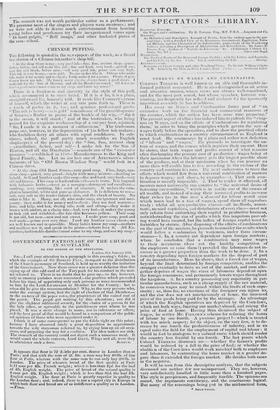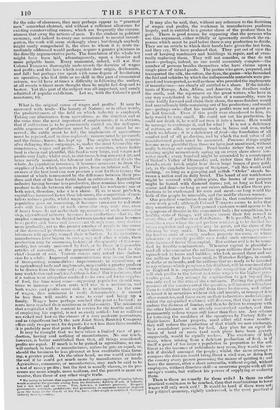TORRENS ON WAGES AND COMBINATION.
Coeoxs:t. TORRENS is well known as an aide and thoroughly-in- formed political economist. Ile is also distinguished as att active and attentive senator, whose s iews are always well.consi.lered, and thr the most part sound, but whose speeches, however con- vincing., are frequently too refired and abstract fin. the ignorantly impatient assembly he has to address.
Ills essay on 1/ itgev and Combination forms part of " an extensive work on the finaneiza and COMILIC!cial resources of the country, which the author has been some time preparing." The present aspect of ;titans has induced him to publish the " chap- ters on Wages, and on the effects of' Combinations ler regulating them," in order to bring the principles which govern the rate of wages fitirly before the operatives, and to show the practical effects to which combinations in a country circumstanced as England is must lead. Ile commences by a plain and rather new detisition of " labour" and " wages." Ile proceeds to investigate the na- ture of wages, and the causes which regulate their amount. Hera he states, that. both wages and profits consist of what remains after discharging the primary cost of prcduction ; wages being at their maximum when the labourer gets the largest possible share of the produce, and at their minimum when he can procure no more than will enable him to live according to the custom of the country and continue Isis race. Ile next endeavours to trace the effects which would flow from a universal combination of masters to depress wages ; and shows, by examples—I. That such com- bination is morally impossible. 2. That to render it effectual, all masters insist universally run counter to " the universal desire of bettering our condition:** which is in reality one of' the causes of all wealth, and instead of using their increased profits to increase their riches (as in this case a demand for labour would arise which must lead to a rise of wages), spend them all unproduc- tively : whilst all non-productive classes—all lasdlords, annui- tants, monied capitalists, and distributors of every class—must not only refrain from embarking their capital in productive business, notwithstanding the rise of profits which this iniquitous preced- ing would have created, but the influx of foreign capital must be forbidden by statute. After disposing of the effects of combinations on the part of the masters, Ile proceeds to consider the results which would follow a combination by workmen, under three circum- stances-1. Ina country not dependent upon foreign markets; where he concludes that a combinatien may raise wages to their maximum (does not the healthy competition of the employers so raise them?) provided the labourers do not in- crease in a greater prorortion than the work to be done. 2. In a country depeoding upon foreign markets for the disposal of part of its manufactures. Here he shows, that a forced rise of' wages, beyond the limit determined by foreign competition, enables the stranger eventually to drive us out of the market, and soon alto- gether deprives of wages the class of' labourers dependent upon the foreign consumers, and permanently lowers wages throughout the kingdom. 3. In a country possessing any superiority in par- ticular manufactures, such as a cheap supply of the raw material, he conceives wages may be raised within the limits of such supe- riority; as, thus liar, no exertions of the foreigner can injure us, and the rise does not act mischievously at home, the increased price of the goods being paid for by the stranger. Au advantage of which the English operatives are deprived by the Corn-laws, which cut both ways, limiting our market abroad, and raising the price of food at home. Having thus dismissed the subject of wages, Ile settles Mr. FIELDEN'S scheme for reducing the hours of labour by one fourth. A precious project I—which is treated with too much respect ; for its object, on the very face, is to de- crease by one fourth the productiveness of industry, and in an equal ratio the field for the employment of capital and labour : it would in !het be analogous to a natural curse which should render the country less fruitful by one fourth. The last points which Colonel TORRENS discusses are— whether the fernier's profits would be reduced by a fall in the price of food; or whether the abolition of the Corn-laws would work mischief both to employers and labourers, by contracting the home market in a greater de- gree than it extended the foreign market. He decides both cases in the negative. It will be seen from this descriptive analysis, that the subjects discussed are neither few nor unimportant. They are, however, very satisfactorily handled in little more than a hundred pages. The style is perspicuous, and frequently forcible. The opinions are sound, the arguments convincing, and the conclusions logical. But many of the reasonings being put in the arithmetical form,
• ADAM SMITIG
for the sake of clearness, they may perhaps appear to " practical men" somewhat abstract, and without a sufficient allowance for existing countervailing causes, which are frequently the circum- stances that sway the actions down. To the student in political economy, and indeed to every one accustomed to mental investi- gation, the work will seem strikingly clear ; but though anybody might easily comprehend it, the class to whom it is more im- mediately addressed would perhapa require a greater plainness in the directly argumentative parts. The foundation of the whole too might have been laid, advantageously, upon a broader aud more palpable basis. Every economist, indeed, will 1.10 that Colonel TomtaNs thoroughly understands the doctrine of wages and profits, and the laws which regulate their origin, declension, and fall; but perhaps (we speak w ith some degree of hesitation) an operative, who had little or no skill in this part of economical science, woeld have at times a difficulty in following the author, at all events without more thought than he might feel disposed to bestow. Yet this part of the subject was all-important, and surely admitted of popular exhibition. Let us, with the Colonel's good assistance, try.



















 Previous page
Previous page